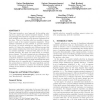Free Online Productivity Tools
i2Speak
i2Symbol
i2OCR
iTex2Img
iWeb2Print
iWeb2Shot
i2Type
iPdf2Split
iPdf2Merge
i2Bopomofo
i2Arabic
i2Style
i2Image
i2PDF
iLatex2Rtf
Sci2ools
121
click to vote
GECCO
2010
Springer
2010
Springer
Knowledge mining with genetic programming methods for variable selection in flavor design
This paper presents a novel approach for knowledge mining from a sparse and repeated measures dataset. Genetic programming based symbolic regression is employed to generate multiple models that provide alternate explanations of the data. This set of models, called an ensemble, is generated for each of the repeated measures separately. These multiple ensembles are then utilized to generate information about, (a) which variables are important in each ensemble, (b) cluster the ensembles into different groups that have similar variables that drive their response variable, and (c) measure sensitivity of response with respect to the important variables. We apply our methodology to a sensory science dataset. The data contains hedonic evaluations (liking scores), assigned by a diverse set of human testers, for a small set of flavors composed from seven ingredients. Our approach: (1) identifies the important ingredients that drive the liking score of a panelist and (2) segments the panelist...
Related Content
| Added | 19 Jul 2010 |
| Updated | 19 Jul 2010 |
| Type | Conference |
| Year | 2010 |
| Where | GECCO |
| Authors | Katya Vladislavleva, Kalyan Veeramachaneni, Matt Burland, Jason Parcon, Una-May O'Reilly |
Comments (0)

